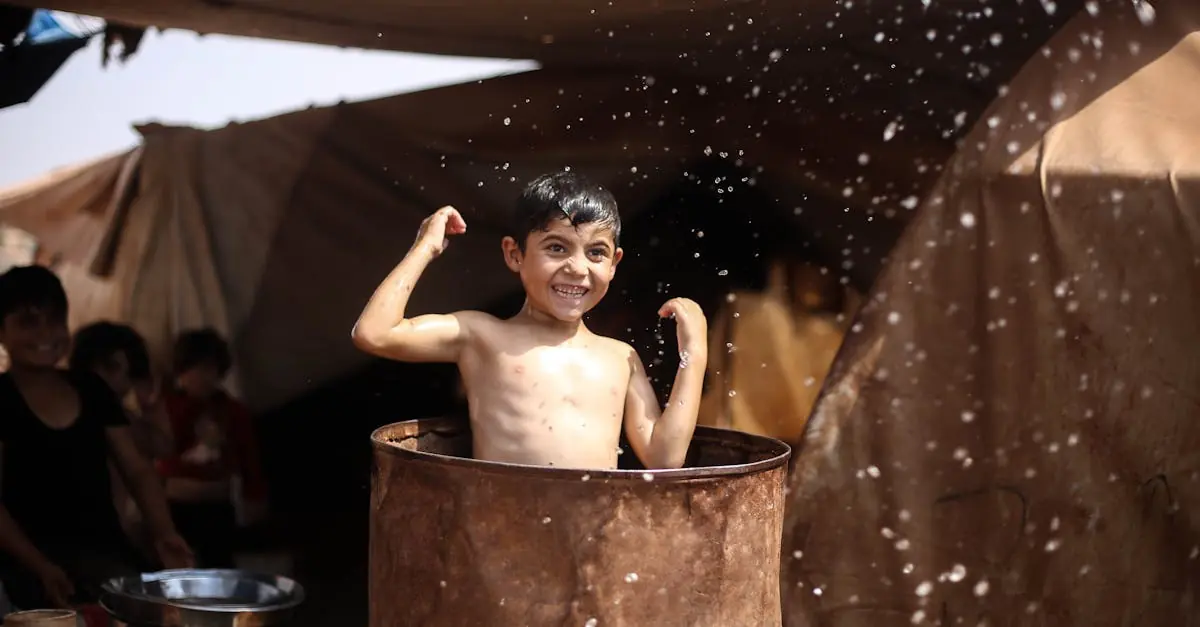Summer camp isn’t just for the adventurous souls who love s’mores and campfire songs; it’s also a magical haven for autistic kids. Imagine a place where they can explore nature, make friends, and unleash their creativity—all while feeling understood and supported. That’s the beauty of summer camp designed specifically for them.
These camps offer more than just fun activities. They create an inclusive environment where kids can thrive, building confidence and social skills while having a blast. Whether it’s conquering the climbing wall or mastering the art of friendship, summer camp can be a transformative experience. So, let’s dive into the world of summer camps tailored for autistic kids and discover how these unique programs can spark joy and growth in ways that traditional camps simply can’t.
Table of Contents
ToggleOverview of Summer Camps for Autistic Kids
Summer camps for autistic kids offer tailored experiences that cater to unique needs. Such camps emphasize creating an environment where every child can thrive. Programs often include activities that promote social interaction, teamwork, and personal development.
Many camps feature trained staff who understand autism spectrum disorders. This expertise enables staff to provide individualized support and adapt activities to suit each child’s abilities. Activities may include art, sports, and nature exploration, all designed to enhance skills while ensuring fun.
Communication strategies play a crucial role in these camps. Some programs use visual aids and social stories to help children understand daily routines and transitions. Making activities predictable reduces anxiety and fosters a sense of security for campers.
Positive reinforcement is key in these environments. Children receive encouragement as they navigate new challenges, which builds confidence. Collaborating with peers helps kids develop friendships, often leading to valuable social skills.
In addition to recreational activities, many camps incorporate life skills training. Camps might include cooking classes, basic hygiene instruction, and personal responsibility exercises. These components increase independence and prepare children for future experiences.
Family involvement is often encouraged to strengthen relationships. Many camps host events for families, allowing them to connect and share experiences. This community support fosters understanding and acceptance.
Overall, summer camps for autistic kids present opportunities for growth and enjoyment. Careful planning and execution ensure these environments are safe, engaging, and beneficial, making them a valuable option for families.
Benefits of Summer Camp for Autistic Kids
Summer camps tailored for autistic kids provide unique advantages that promote overall well-being. These camps emphasize fun activities while simultaneously enhancing skills in a supportive environment.
Social Skills Development
Social skills development plays a crucial role in summer camps for autistic children. Engaging in group activities encourages children to communicate and collaborate with peers. Opportunities arise for practicing social interactions, which builds confidence. Structured playtime helps kids learn the nuances of sharing, turn-taking, and making friends. Trained staff guide these interactions, ensuring every child participates meaningfully. Workshops may include role-playing scenarios to reinforce positive social behaviors. As children explore these social opportunities, they often discover increased comfort in group settings, allowing for deeper relationships and lasting friendships.
Emotional Growth
Emotional growth emerges as campers experience new challenges and triumphs. Summer camps foster resilience, allowing kids to navigate various feelings in a safe setting. Positive reinforcement from staff builds self-esteem and encourages self-expression. Activities are designed to help children recognize their emotions, facilitating discussions around feelings. Participating in team-building exercises promotes empathy, underscoring the value of understanding others. The structured environment of a summer camp also reduces anxiety, offering stability that supports emotional well-being. By the end of camp, many children demonstrate improved emotional regulation and a heightened sense of self-worth.
Types of Summer Camps Available
Various summer camps cater to autistic children, each designed to meet specific needs. These camps include day camps, overnight camps, and specialty camps, providing unique experiences.
Day Camps
Day camps operate for several hours during the day, allowing children to return home each evening. These camps usually focus on structured activities that promote social skills and personal growth. Daily schedules include games, arts and crafts, and team-building exercises. Trained staff members lead activities, ensuring a supportive environment. Families appreciate day camps as they offer flexibility and familiarity while giving children socialization opportunities.
Overnight Camps
Overnight camps provide immersive experiences, allowing autistic children to stay for extended periods. These camps help foster independence and self-reliance as kids navigate living away from home. Campers participate in diverse activities, such as swimming, hiking, and cooking classes, promoting teamwork and friendship. Individualized support from trained counselors ensures a safe atmosphere. Many parents notice improved confidence and social skills in their children upon returning home.
Specialty Camps
Specialty camps cater to specific interests, such as art, sports, or technology. These camps provide opportunities for autistic children to explore their passions in depth. Emphasis on particular activities allows kids to develop skills while enjoying fun experiences. Campers benefit from engaging with peers who share similar interests, fostering meaningful connections. Structured programs help children enhance self-expression and creativity, ensuring an enriching environment.
Choosing the Right Summer Camp
Selecting the appropriate summer camp for an autistic child requires careful consideration. Each camp offers various structures and programs tailored to different needs.
Considerations for Parents
Parents should assess the camp’s approach to autism. Understanding how staff interacts with campers can reveal insights into their training and commitment. Evaluating the camp’s communication strategies, such as the use of visual aids, helps ensure a supportive environment. Safety protocols play a crucial role in camps, impacting children’s well-being and comfort. Parents might also consider the staff-to-camper ratio, which influences the level of individualized attention each child receives. Checking for family involvement opportunities strengthens connections and support networks. Additionally, exploring feedback from other parents can offer further clarity.
Questions to Ask Camp Directors
Parents can ask camp directors about staff qualifications. Inquire about training programs that enhance staff skills in handling various aspects of autism. Understanding daily schedules and activities reveals how structured and flexible the camp environment is. Asking about social skills development initiatives helps gauge the camp’s focus on fostering interpersonal relationships. Questions regarding how conflicts are managed provide insight into the camp’s approach to behavioral challenges. Parents may also want to discuss how progress is communicated to families throughout the camp session. Finally, exploring available resources for emergencies is essential for ensuring peace of mind.
Summer camps for autistic kids offer an invaluable opportunity for growth and development in a nurturing environment. These camps not only focus on fun and engaging activities but also prioritize social skills and emotional well-being. With trained staff who understand the unique needs of each child, campers can thrive while building confidence and independence.
Choosing the right camp is essential for maximizing these benefits. Parents should consider factors like staff qualifications and camp structure to ensure a supportive experience. By investing in a specialized summer camp, families can help their children create lasting memories, forge friendships, and develop essential life skills that extend far beyond the summer months.






